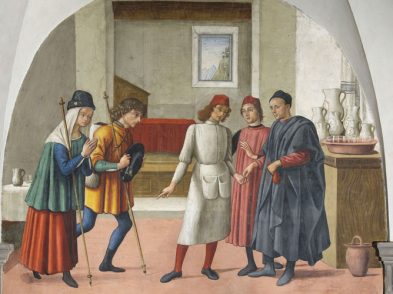In February 1958, the Italian Parliament enacted Law No. 75/1958 or the Law on the Abolition of the Regulation of Prostitution and the Fight Against the Exploitation of the Prostitution of Others. Widely called the ‘Merlin’ law, it came into force six months later. The law took its popular name from its promoter and first signatory, Senator Angelina Merlin, or ‘Lina’ for short. It did not explicitly prohibit prostitution as such but abolished prostitution regulated by the state and punished those involved in procuring and exploiting prostitutes. Consequently, more than 700 houses of prostitution or brothels were shut down.
Since unification in 1860, Italy, like France and Germany, had regulated prostitution in closed houses, where prostitutes were subjected to mandatory medical control and deprived of many of their civil rights. A senator of the Italian Socialist Party, Merlin began her abolitionist campaign in 1948, following in the footsteps of Marthe Richard, who had the bordellos in France closed down in 1946. Her tireless battle for the next 10 years was to split Italy into two camps—sometimes with inadvertently comic overtones. Those who supported her included the Christian Democrat Party, which upheld Catholic values. Those who opposed her included some members of her own party, together with the majority of the extreme right party and the Monarchists. Rarely in Italian politics has a politician been so fiercely detested or so frequently threatened and insulted as was Merlin.
Not surprisingly, her opponents were led by the brothel keepers, who financed a vicious newspaper campaign against her. They protested that the law struck the identity of Italian men, their natural appetites and privileges as well as at the age old ritual whereby sons, often accompanied by their fathers, acquired their ‘manhood’ at a brothel. After World War II, Italy was still a patriarchal, rural society, only gradually moving towards the industrial boom of the 1960s. Sexual mores for men were very different from those for women. For women, pre-marital sex was taboo and ‘good’ girls were expected to be virgins when they married. The Catholic Church forbade contraception and abortion. Until 1968, adultery was considered a crime for women but only in special circumstances was it one for men.
Others foes of the law warned that the abolition of mandatory medical checks on prostitutes would lead to a rapid increase of syphilis and other venereal diseases. Perhaps its most famous opponent was the journalist Indro Montanelli, who in 1956 dedicated to the brothels an impassioned pamphlet called Addio Wanda (‘Goodbye Wanda’). In 1955, to defend her abolitionist position, Merlin, with Carla Barberis, the wife of Sandro Pertini, who later became president of the Republic, published a book entitled Lettere dalle case chiuse (‘Letters from the Closed Houses of Prostitution’). Through a series of 70 letters written by prostitutes both for and against the closure, the desolate and often squalid existence of women who lived in the nationally regulated bordellos emerged. One prostitute wrote ‘one special day I counted 120 clients, 120 douchings, 2400 stairs up and down, and then, as if that wasn’t enough… some clients when they have finished … lecture us and urge us to change our way of life… we have to save our souls, they tell us!!!’(Letter No. 68).One thing, however, seems certain. The main reason it took 10 years for the law to pass was the silent opposition of the male members of Parliament, who simply refused to put the issue on the agenda for debate.
Merlin is remembered not only for the law bearing her name. After the war, she became a member of the Constituent Assembly and was the first woman to be elected to the Senate. She was instrumental in having women’s and children’s rights protected under the new Constitution. She is also recognised for her assistance in the Polesine area of northern Italy that was devastated in September 1952 by a flood that killed 84 people and left more than 180,000 homeless.
Born in Pozzonovo, Padua, in 1887, Merlin was trained as a teacher. But, after being dismissed for refusing to swear allegiance to the Fascist regime, she became a full-time political activist. She remained in Parliament until 1961, when she retired. She died in Milan in 1979.
And what is the position of the Merlin law in Italy today? Figures released in 2003 by the Committee on Social Affairs of the Italian Chamber of Deputies indicated that there were between 50,000 to 70,000 prostitutes in Italy. Of these, about 25,000 were immigrants; 2,000 minors; and over 2,000 women and children had been forced into slavery and exploited for prostitution. About 65 percent worked on the street and 29.1 percent in hotels. The others received their clients at home. The vast majority were women (94.2 percent), 5 percent were transsexuals and 0.8 percent transvestites.
Since 1958, numerous attempts have been made to reform the Merlin law, but reformers differ widely in their approach to what form a new legislation should take.








